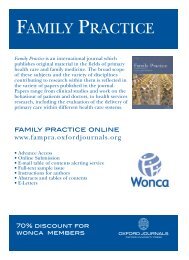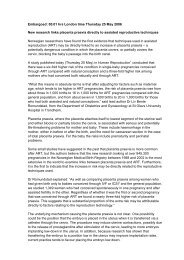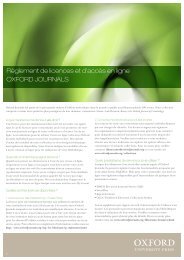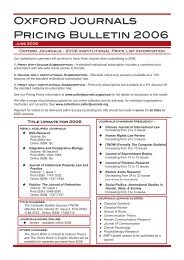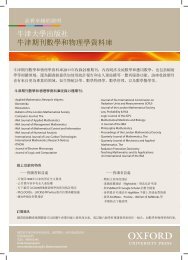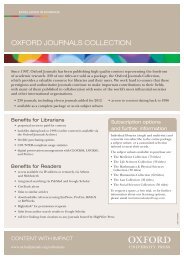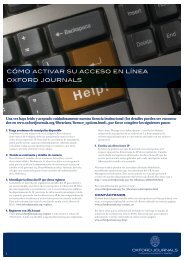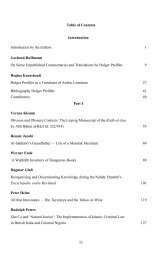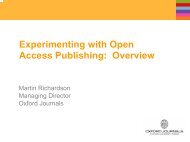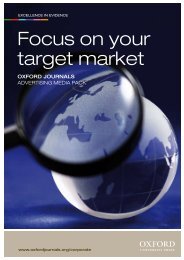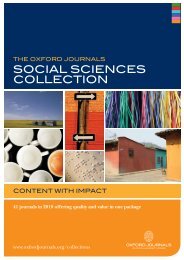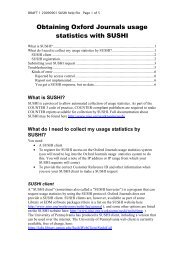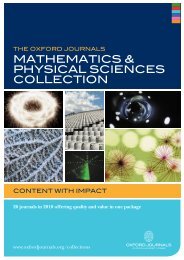Download the ESMO 2012 Abstract Book - Oxford Journals
Download the ESMO 2012 Abstract Book - Oxford Journals
Download the ESMO 2012 Abstract Book - Oxford Journals
You also want an ePaper? Increase the reach of your titles
YUMPU automatically turns print PDFs into web optimized ePapers that Google loves.
Annals of Oncology<br />
intravenously (IV) over 30–90 mins. An SC formulation of H has been developed,<br />
which is rapidly administered (up to 5 mins), potentially improving convenience for<br />
patients and clinical staff, and reducing administration costs. The Phase III HannaH<br />
study (NCT00950300) demonstrated that <strong>the</strong> pharmacokinetics and efficacy of H-SC<br />
were non-inferior to that of H-IV, meeting <strong>the</strong> co-primary endpoints. The safety<br />
profile of H-SC was comparable and consistent with <strong>the</strong> known safety profile of<br />
H-IV. SafeHer is designed to fur<strong>the</strong>r evaluate <strong>the</strong> safety and tolerability of H-SC in a<br />
broader patient population; to allow greater understanding of a range of safety data.<br />
H-SC will be administered via one of two different routes (handheld syringe [vial<br />
formulation] or single-use injection device [SID]; which allows self-administration).<br />
Supportive data on SID safety and patient satisfaction with self-administration will be<br />
collected.<br />
Methods: SafeHer is a multicentre, international, Phase III open-label trial<br />
(NCT01566721). The primary objective is <strong>the</strong> safety and tolerability of H-SC.<br />
Secondary objectives include disease-free survival, overall survival and patient<br />
satisfaction with SID administration. Immunogenicity of H and recombinant human<br />
hyaluronidase in a subset of patients using <strong>the</strong> SID at select sites is an exploratory<br />
objective. Planned enrolment is 2500 patients, assigned to one of two cohorts at <strong>the</strong><br />
investigators’ discretion ± concurrent/sequential chemo<strong>the</strong>rapy. All patients will<br />
receive H-SC at a fixed dose of 600mg regardless of body weight, for a total of 18<br />
cycles (q3w) via injection into <strong>the</strong> thigh over a period of up to 5 minutes. Patients in<br />
cohort A (n = 1800) will receive H-SC using handheld syringes. Patients in cohort B<br />
(n = 700) will receive H-SC using an SID, first via assisted administration and <strong>the</strong>n<br />
self-administered (in select patients). Enrolment began in May <strong>2012</strong> and parallel<br />
substudies may be performed at selected centres to evaluate medical resource<br />
utilisation (“time and motion study”).<br />
Disclosure: J. Gligorov: I disclose potential conflict of interest : advisory boards and<br />
speaker honoraria for Roche laboratories. H.A. Azim: I serve on <strong>the</strong> advisory board<br />
of Roche in <strong>the</strong> middle east. B. Ataseven: I am a Roche International Steering<br />
Committee member for <strong>the</strong> SafeHer trial. I have received speaker honoraria from<br />
Roche for giveing lectures. I participated in and received a travel grant from Roche<br />
for SABCS 2011. M. Delaurentiis: I am a member of a Roche Advisory Board. F.<br />
Herbst: I am an employee of, and am a stockholder in, F. Hoffmann-La Roche. A.<br />
Llombart: I am a member of a Roche Advisory Board. S. Osborne: I am an employee<br />
of Roche. X. Pivot: I am a member of Roche and GSK Advisory Boards. All o<strong>the</strong>r<br />
authors have declared no conflicts of interest.<br />
316TiP DENOSUMAB VERSUS PLACEBO AS ADJUVANT<br />
TREATMENT FOR WOMEN WITH EARLY-STAGE BREAST<br />
CANCER AT HIGH RISK OF DISEASE RECURRENCE<br />
(D-CARE): AN IN PROGRESS, PHASE 3 CLINICAL TRIAL<br />
R.E. Coleman 1 , C. Barrios 2 , R. Bell 3 , D.M. Finkelstein 4 ,H.Iwata 5 , M. Martin 6 ,<br />
A. Braun 7 ,C.Ke 8 , T. Maniar 7 , P.E. Goss 9<br />
1 Academic Unit of Clinical Oncology, University of Sheffield, Sheffield Cancer<br />
Research Centre, Sheffield, UNITED KINGDOM, 2 Department of Medicine,<br />
PUCRS School of Medicine, Porto Alegre, BRAZIL, 3 The Andrew Love Cancer<br />
Centre, Geelong Hospital:Deakin University, Geelong, AUSTRALIA, 4 Biostatistics,<br />
Massachusetts General Hospital, Boston, MA, UNITED STATES OF AMERICA,<br />
5 Aichi Cancer Center, Breast Oncology, Nagoya University School of Medicine,<br />
Nagoya, JAPAN, 6 Medical Oncology Service, Hospital General Universitario<br />
Gregorio Marañón, Madrid, SPAIN, 7 Hematology/oncology, Amgen Inc.,<br />
Thousand Oaks, CA, UNITED STATES OF AMERICA, 8 Biostatistics, Amgen Inc.,<br />
Thousand Oaks, CA, UNITED STATES OF AMERICA, 9 Cancer Center,<br />
Massachusetts General Hospital, Boston, MA, UNITED STATES OF AMERICA<br />
Background: Bone represents approximately 40% of all first recurrences in<br />
women with early-stage breast cancer and is a common site of distant<br />
recurrence. In preclinical studies, RANKL inhibition significantly delays skeletal<br />
tumour formation, reduces skeletal tumour burden, and prolongs survival of<br />
tumour-bearing mice. Denosumab is approved for <strong>the</strong> prevention of<br />
skeletal-related events (SREs) in patients with established bone metastases from<br />
solid tumours.<br />
Purpose: The D-CARE trial is designed to assess if denosumab treatment<br />
prolongs bone metastasis-free survival (BMFS) and disease-free survival (DFS)<br />
in <strong>the</strong> adjuvant breast cancer setting. The primary endpoint of this<br />
event-driven trial is BMFS. Secondary endpoints include DFS and overall<br />
survival. Additional endpoints are safety, breast density, incidence of SREs<br />
(following <strong>the</strong> development of bone metastasis), patient reported outcomes, and<br />
biomarkers.<br />
Methods: In this international, randomized, double-blind, and placebo<br />
controlled phase 3 trial, approximately 4,500 women with stage II or III breast<br />
cancer, at high risk for recurrence and with known hormone and HER-2<br />
receptor status, are eligible. High risk is defined as biopsy evidence of breast<br />
cancer in regional lymph nodes, tumour size > 5 cm, (T3), or locally advanced<br />
disease (T4). Standard-of-care adjuvant or neoadjuvant chemo-, endocrine, or<br />
HER-2 targeted <strong>the</strong>rapy, alone or in combination, must be planned. Patients<br />
with a prior history of breast cancer (except DCIS or LCIS) or distant<br />
metastasis, oral bisphosphonate (BP) use within 1 year of randomization, or<br />
any intravenous BP use, are not eligible. Patients are randomized 1:1 to receive<br />
denosumab 120 mg or placebo subcutaneously monthly for 6 months, <strong>the</strong>n<br />
every 3 months for a total of 5 years of treatment. Supplemental vitamin D (≥<br />
400 IU) and calcium (≥ 500 mg) will be administered. The trial, sponsored by<br />
Amgen Inc. and registered with <strong>the</strong> ClinicalTrials.gov identifier NCT01077154,<br />
began enrolling patients in June 2010 and isexpectedtocompleteenrolmentin<br />
late <strong>2012</strong>.<br />
Disclosure: R.E. Coleman: O<strong>the</strong>r substantive relationships: Expert testimony -<br />
Novartis. R. Bell: Advisory Board Member : Amgen. M. Martin: Advisory Board<br />
Member amgen, roche, bayer, novartis, gsk, sanofi. A. Braun: Employee : Amgen<br />
Inc Stock : Amgen Inc. C. Ke: Employer : Amgen Inc. Stock ownership : Amgen Inc.<br />
T. Maniar: Employee :: Amgen Inc. Stock ownership :: Amgen Inc. P.E. Goss:<br />
Honoraria for Pfizer and Novartis. All o<strong>the</strong>r authors have declared no conflicts of<br />
interest.<br />
Volume 23 | Supplement 9 | September <strong>2012</strong> doi:10.1093/annonc/mds392 | ix115



